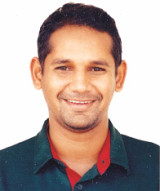Nationality: Bangladesh
Position: Batsman
Batting Style: Right Hand Bat
Bowling Style: Right Arm Offbreak
Date of Birth: 1972-08-17 Age: 52

Qazi Habibul Bashar, known as Habibul Bashar, is a former professional cricket player from Bangladesh.
Born on August 17, 1972, in Pabna, a district in Bangladesh, Bashar became one of the most influential and iconic players for his country during his career.
As a right-handed batsman, Bashar was known for his impish and impulsive playing style, showcasing an array of strokes that made him a genuine test player.
Bashar's batting prowess was primarily seen in his cultured drives through midwicket, which contributed significantly to his runs.
However, his excessive addiction to the hook shot often led to his dismissal, reminiscent of former Australian batsman David Hilditch.
Bashar promised to address this issue before Bangladesh's inaugural Test but fell into the same pattern in both innings, getting out hooking twice.
Despite this, his resilience and determination were evident as he scored 71 and 30 runs.
Habibul Bashar became the epitome of consistency in the Bangladesh middle-order, earning himself the nickname "Mr.
Fifty" due to his ability to score a string of half-centuries in Test cricket.
Over his career, he recorded 24 half-centuries and three centuries, the first of which came in 2001 during a match against Zimbabwe where Bangladesh were facing a massive first-innings score.
His knock of 108 not out demonstrated his skill and cemented his position as the best batsman of a struggling generation.
In 2003, Bashar added another century to his name while playing against Pakistan in Karachi.
This outstanding innings helped Bangladesh stay in the game.
His final Test century arrived in a well-earned draw against the West Indies in Gros Islet.
However, Bashar's performance in One-Day Internationals (ODIs) was underwhelming.
Despite representing his country in 111 matches, his batting average remained below 22.
Nevertheless, his leadership qualities caught the attention of the cricketing world when he was appointed as the captain of the Bangladesh national team.
Bashar had an inauspicious start to his captaincy, getting dismissed for a pair (two consecutive ducks) in his debut match against Zimbabwe in Harare in 2004.
Yet, alongside coach Dav Whatmore, he managed to bring discipline and balance to a relatively young team.
Under his leadership, Bangladesh achieved remarkable success, including the historic five-wicket victory over Australia in an ODI in Cardiff in 2005, which is considered one of cricket's greatest upsets.
Bashar was also at the helm when Bangladesh claimed their first Test and series victory against Zimbabwe in Chittagong in 2004.
Despite these achievements, as Bashar's individual performance declined, there was increasing media scrutiny and calls for his removal as captain.
In 2007, Mohammad Ashraful replaced him as captain.
Bashar, however, continued to contribute to Bangladesh cricket, joining the rebel Indian Cricket League in 2008.
This decision, while controversial, ultimately led to his rehabilitation.
In 2011, Habibul Bashar's cricketing journey took a new direction as he was appointed as one of three national selectors in Bangladesh.
This role allowed him to share his wealth of experience and knowledge with a new generation of cricketers.
Habibul Bashar's legacy as a cricketer remains significant in Bangladesh's cricketing history.
His style, strokes, and determination continue to inspire both aspiring and established players in the country.
As a key figure in leading Bangladesh's rise in international cricket, he played a vital role in putting his nation on the map of world cricket.
Batting Stats
| Format | Mat | Inns | NO | Runs | HS | Ave | BF | SR | 100s | 50s | 6s | 4s |
|---|
Bowling Stats
| Format | Mat | Inns | Wkts | Runs | Overs | Ave | Econ | Wide | NoBall | 4w | 5w | 10w |
|---|
Last updated:





